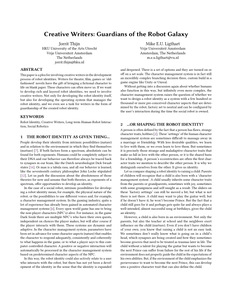This paper is a plea for involving creative writers in the developmentprocess of robot identities. Writers for theatre, film, games or ’old-fashioned’ novels have the gift of bringing a fictional character tolife on blank paper. These characters can often move us. If we wantto develop rich and layered robot identities, we need to involvecreative writers. Not only for developing the robot identity itself,but also for developing the operating system that manages therobot identity, and we even see a task for writers in the form ofguardianship of the created robot identity
DOCUMENT

In publications addressing literary reflections on Europe, little attention has been paid to emerging cultural networks, the role of EU subsidies, or literary organisations engaging writers in initiatives aimed at contemplating the challenges that the European Union faces. This dissertation aims to explain the role of new initiatives by presenting four recent, transnational literary projects as case studies: the “Literatur Express Europa 2000”; “The European Constitution in Verse”; “Narratives for Europe”; and “The Return of Europe”. The projects were analysed through an examination of three fundamental aspects: the expectations held by the cultural organisations regarding their initiatives; the cultural artefacts resulting from the projects; and the effects of the projects in the public sphere. By selecting literary projects about Europe as case studies, rather than individual authors or texts, this research allows for an interdisciplinary approach that reveals the interaction between EU politics, civil society, cultural networks, and individual authors.
LINK
The report from Inholland University is dedicated to the impacts of data-driven practices on non-journalistic media production and creative industries. It explores trends, showcases advancements, and highlights opportunities and threats in this dynamic landscape. Examining various stakeholders' perspectives provides actionable insights for navigating challenges and leveraging opportunities. Through curated showcases and analyses, the report underscores the transformative potential of data-driven work while addressing concerns such as copyright issues and AI's role in replacing human artists. The findings culminate in a comprehensive overview that guides informed decision-making in the creative industry.
MULTIFILE

HKU en Wintertuin geven met het onderzoeksproject Speculatieve scenario’s voor sociale robots in de zorg vorm aan een nieuwe visie op de impact die auteurs en kunstenaars in de 21e eeuw kunnen hebben op maatschappelijke problemen, doordat zij onderdeel worden van een transdisciplinair en co-creatief collectief. In deze KIEM-Creatieve Industrie aanvraag kiezen we een vernieuwend perspectief voor het onderzoek naar de rol van verbeelding en literaire verteltechnieken voor het gebruik van sociale robots in de zorg. We blikken samen met de Vrije Universiteit en met praktijkpartners vooruit op hoe de context van de zorg voor mensen met dementie er in de toekomst uit kan zien als sociale robots hier een serieuze rol in krijgen. Door een methode van speculatief onderzoek richten we ons op de verschillende mogelijke rollen van dit type robots en maken we door (literaire) verbeelding voorstelbaar en inzichtelijk wat dit in deze scenario’s betekent voor de mensen met dementie, voor de betrokken zorgmedewerkers en voor de naaste omgeving. Tegelijk laten we zien wat de impact hiervan op de organisatie van de zorg kan zijn: Hoe kunnen robots bijdragen aan transitieopgaves in de zorg als onderdeel van blended care? Waar de zorg vaak technologisch, praktisch en efficiënt gedreven is, onderzoeken wij juist de mogelijkheden die ervaringsgericht zijn, gaan over betekenisvolle interactie en kwaliteit van (samen)leven. Deelvraag hierbij is hoe schrijvers en ontwerpers met dit vraagstuk hun eigen artistieke en ontwerppraktijken kunnen (door)ontwikkelen en verrijken. We doen praktijkgericht onderzoek in de werkelijke leef- en werkomgeving van mensen zelf. Als onderzoeksvorm kiezen we voor residenties van een robot met ontwerpers en schrijvers op locatie in de zorgcontext: de zogenoemde living labs sessies. Het onderzoek leidt tot (toekomst)scenario's voor sociale robots in de zorg. Deze speculatieve scenario’s leiden tot inzichten en perspectief voor de verschillende betrokken professionele praktijken.